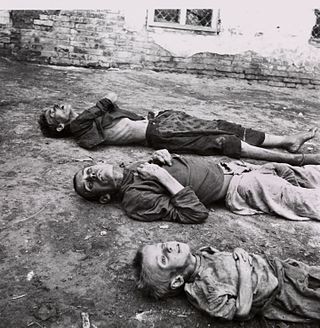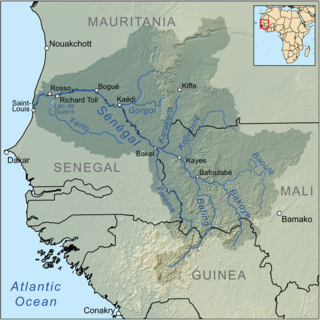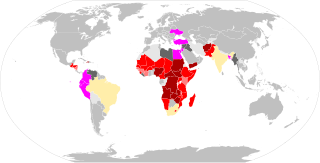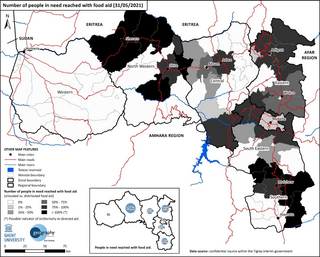Related Research Articles

The World Food Programme (WFP) is an international organization within the United Nations that provides food assistance worldwide. It is the world's largest humanitarian organization and the leading provider of school meals. Founded in 1961, WFP is headquartered in Rome and has offices in 80 countries. As of 2021, it supported over 128 million people across more than 120 countries and territories.

A famine is a widespread scarcity of food, caused by several factors including war, natural disasters, crop failure, widespread poverty, an economic catastrophe or government policies. This phenomenon is usually accompanied or followed by regional malnutrition, starvation, epidemic, and increased mortality. Every inhabited continent in the world has experienced a period of famine throughout history. During the 19th and 20th century, Southeast and South Asia, as well as Eastern and Central Europe, suffered the greatest number of fatalities. Deaths caused by famine declined sharply beginning in the 1970s, with numbers falling further since 2000. Since 2010, Africa has been the most affected continent in the world by famine.
Humanitarian aid workers belonging to United Nations organisations, PVOs / NGOs or the Red Cross / Red Crescent are among the list of protected persons under international humanitarian law that grant them immunity from attack by belligerent parties. However, attacks on humanitarian workers have occasionally occurred, and become more frequent since the 1990s and 2000s. In 2017, the Aid Worker Security Database (AWSD) documented 139 humanitarian workers killed in intentional attacks out of the estimated global population of 569,700 workers. In every year since 2013, more than 100 humanitarian workers were killed. This is attributed to a number of factors, including the increasing number of humanitarian workers deployed, the increasingly unstable environments in which they work, and the erosion of the perception of neutrality and independence. In 2012 road travel was seen to be the most dangerous context, with kidnappings of aid workers quadrupling in the last decade, reaching more aid workers victims than any other form of attack.

Humanitarian aid is material and logistic assistance to people who need help. It is usually short-term help until the long-term help by the government and other institutions replaces it. Among the people in need are the homeless, refugees, and victims of natural disasters, wars, and famines. Humanitarian relief efforts are provided for humanitarian purposes and include natural disasters and human-made disasters. The primary objective of humanitarian aid is to save lives, alleviate suffering, and maintain human dignity. It may, therefore, be distinguished from development aid, which seeks to address the underlying socioeconomic factors which may have led to a crisis or emergency. There is a debate on linking humanitarian aid and development efforts, which was reinforced by the World Humanitarian Summit in 2016. However, the conflation is viewed critically by practitioners.
In 2006, an acute shortage of food affected the countries in the Horn of Africa, as well as northeastern Kenya. The United Nations's Food and Agriculture Organization (FAO) estimated on January 6, 2006, that more than 11 million people in these countries may be affected by an impending widespread famine, largely attributed to a severe drought, and exacerbated by military conflicts in the region.

FEWS NET, the Famine Early Warning Systems Network, is a website of information and analysis on food insecurity created in 1985 by the United States Agency for International Development (USAID), and the US Department of State, after famines in East and West Africa. In 2008, Molly E. Brown argued that during its twenty years of activity, FEWS NET had been extremely successful. She said that it was widely viewed as "the most effective program in existence for providing information to governments about impending food crises".
Various international and local diplomatic and humanitarian efforts in the Somali Civil War have been in effect since the conflict first began in the early 1990s. The latter include diplomatic initiatives put together by the African Union, the Arab League and the European Union, as well as humanitarian efforts led by the Office for the Coordination of Humanitarian Affairs (OCHA), UNICEF, the World Food Programme (WFP), the Puntland Maritime Police Force (PMPF) and the Somali Red Crescent Society (SRCS).
A cash transfer is a direct transfer payment of money to an eligible person. Cash transfers are either unconditional cash transfers or conditional cash transfers. They may be provided by organisations funded by private donors, or a local or regional government.

A large-scale, drought-induced famine occurred in Africa's Sahel region and many parts of the neighbouring Sénégal River Area from February to August 2010. It is one of many famines to have hit the region in recent times.

Occurring between July 2011 and mid-2012, a severe drought affected the entire East African region. Said to be "the worst in 60 years", the drought caused a severe food crisis across Somalia, Djibouti, Ethiopia and Kenya that threatened the livelihood of 9.5 million people. Many refugees from southern Somalia fled to neighboring Kenya and Ethiopia, where crowded, unsanitary conditions together with severe malnutrition led to a large number of deaths. Other countries in East Africa, including Sudan, South Sudan and parts of Uganda, were also affected by a food crisis.

Adeso is Nairobi-based humanitarian non-governmental organization.

The United Nations World Humanitarian Summit (WHS) was held in Istanbul, Turkey, on May 23 and 24, 2016. The summit was an initiative of the Secretary-General of the United Nations Ban Ki-moon and was organized by the United Nations Office for the Coordination of Humanitarian Affairs.
Since 2016, a food insecurity crisis has been ongoing in Yemen which began during the Yemeni Civil War. The UN estimates that the war has caused an estimated 130,000 deaths from indirect causes which include lack of food, health services, and infrastructure as of December 2020. In 2018, Save the Children estimated that 85,000 children have died due to starvation in the three years prior. In May 2020, UNICEF described Yemen as "the largest humanitarian crisis in the world", and estimated that 80% of the population, over 24 million people, were in need of humanitarian assistance. In September 2022, the World Food Programme estimated that 17.4 million Yemenis struggled with food insecurity, and projected that number would increase to 19 million by the end of the year, describing this level of hunger as "unprecedented." The crisis is being compounded by an outbreak of cholera, which resulted in over 3000 deaths between 2015 and mid 2017. While the country is in crisis and multiple regions have been classified as being in IPC Phase 4, an actual classification of famine conditions was averted in 2018 and again in early 2019 due to international relief efforts. In January 2021, two out of 33 regions were classified as IPC 4 while 26 were classified as IPC 3.

In the early months of 2017, parts of South Sudan experienced a famine following several years of instability in the country's food supply caused by war and drought. The famine, largely focused in the northern part of the country, affected an estimated five million people. In May 2017, the famine was officially declared to have weakened to a state of severe food insecurity.

In 2017 a drought ravaged Somalia that has left more than 6 million people, or half the country's population, facing food shortages with several water supplies becoming undrinkable due to the possibility of infection.

During the COVID-19 pandemic, food insecurity has intensified in many places – in the second quarter of 2020 there were multiple warnings of famine later in the year. In an early report, the Nongovernmental Organization (NGO) Oxfam-International talks about "economic devastation" while the lead-author of the UNU-WIDER report compared COVID-19 to a "poverty tsunami". Others talk about "complete destitution", "unprecedented crisis", "natural disaster", "threat of catastrophic global famine". The decision of WHO on March 11, 2020, to qualify COVID as a pandemic, that is "an epidemic occurring worldwide, or over a very wide area, crossing international boundaries and usually affecting a large number of people" also contributed to building this global-scale disaster narrative.

Beginning with the onset of the Tigray War in November 2020, acute food shortages leading to death and starvation became widespread in northern Ethiopia, and the Tigray, Afar and Amhara Regions in particular. As of August 2022, there are 13 million people facing acute food insecurity, and an estimated 150,000–200,000 had died of starvation by March 2022. In the Tigray Region alone, 89% of people are in need of food aid, with those facing severe hunger reaching up to 47%. In a report published in June 2021, over 350,000 people were already experiencing catastrophic famine conditions. It is the worst famine to happen in East Africa since 2011–2012.

The Grand Bargain: Agenda for Humanity, usually called the Grand Bargain, is an agreement to reform the delivery of humanitarian aid, that was struck at the World Humanitarian Summit in May 2016. The agreement contains 51 specific commitments, grouped into ten focus areas, with activity targets to be completed by January 1, 2020.

Localisation is the practice, in humanitarian aid, to give more decision making power and funding to organizations and people that are based in countries affected by humanitarian emergencies.

The 1992 famine in Somalia resulted from a severe drought and devastation caused by warring factions in southern Somalia, primarily the Somali National Front, in the fertile inter-riverine breadbasket between the Jubba and Shebelle rivers. The resulting famine primarily affected residents living in the riverine area, predominantly in Bay Region, and those internally displaced by the civil war.
References
- ↑ Fiegl, Amanda (2014-11-26). "A Somali Aid Worker Would Rather Give Out Cash Than Free Food". NPR. Retrieved 2022-03-26.
- 1 2 3 4 The Editorial Board (2021-02-13). "Opinion | Foreign Aid Is Having a Reckoning". The New York Times. ISSN 0362-4331 . Retrieved 2022-03-26.
- 1 2 3 Wall, Imogen (2016-03-21). "'We are demanding change': the Somali woman taking on international NGOs". the Guardian. Retrieved 2022-03-26.
- ↑ Rooney, F. (2007). Exceptional Women Environmentalists. Canada: Second Story Press.
- ↑ "Degan Ali announced as Oceania Connect opening keynote speaker". ACFID. 2020-10-09. Retrieved 2022-03-27.
- ↑ "Does Africa need foreign aid?". The New Times | Rwanda. 2021-02-21. Retrieved 2022-03-26.
- ↑ "10 of the best humanitarians to follow on social media". the Guardian. 2016-04-18. Retrieved 2022-03-26.
- ↑ "Degan Ali". World Economic Forum. Retrieved 2022-03-27.
- ↑ "NGOs: bridging the North South divide". The New Humanitarian. 2015-06-08. Retrieved 2022-03-26.
- ↑ Doane, Deborah (10 Dec 2019). "Are INGOs ready to give up power?". openDemocracy. Retrieved 2022-03-27.
- ↑ Houghton, Irũngũ (10 Oct 2016). "Five disempowering traits that international NGOs must drop". openDemocracy. Retrieved 2022-03-27.
- ↑ "Le mouvement Black Lives Matter contraint les ONG humanitaires à un examen de conscience". Le Monde.fr (in French). 2020-07-07. Retrieved 2022-03-27.
- ↑ "Sir Ronald Cohen: Victory is in sight!". www.pioneerspost.com. 2021-10-06. Retrieved 2022-03-26.
- ↑ Aly, Heba (2022-08-12). "Ten efforts to decolonise aid". The New Humanitarian. Retrieved 2022-11-13.
- ↑ Maxwell, Daniel; Fitzpatrick, Merry (2012-12-01). "The 2011 Somalia famine: Context, causes, and complications". Global Food Security. Special Issue on the Somalia Famine of 2011-2012. 1 (1): 5–12. doi:10.1016/j.gfs.2012.07.002. ISSN 2211-9124.
- ↑ Coughlan de Perez, E.; van den Hurk, B.; van Aalst, M. K.; Jongman, B.; Klose, T.; Suarez, P. (2015-04-23). "Forecast-based financing: an approach for catalyzing humanitarian action based on extreme weather and climate forecasts". Natural Hazards and Earth System Sciences. 15 (4): 895–904. Bibcode:2015NHESS..15..895C. doi: 10.5194/nhess-15-895-2015 . ISSN 1561-8633.
- ↑ Nor, Mohamed Ibrahim. "Do the global oil price shocks affect Somalia's unregulated exchange rate volatility?." (2018). APA
- ↑ Grosh, Margaret, et al. For protection and promotion: The design and implementation of effective safety nets. World Bank Publications, 2008.